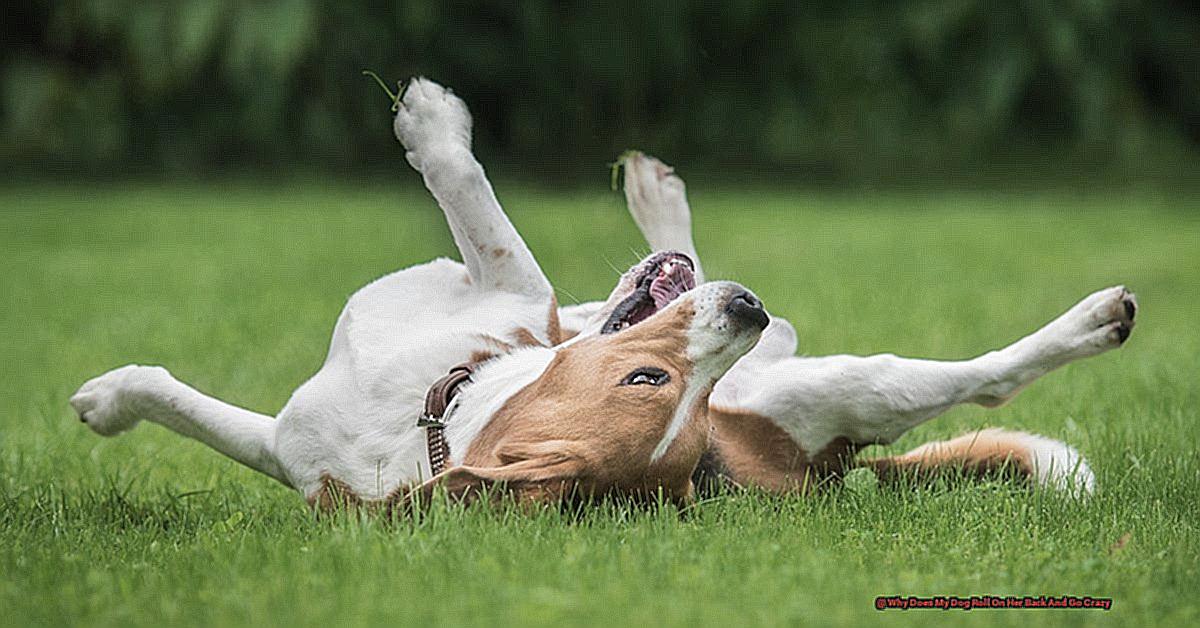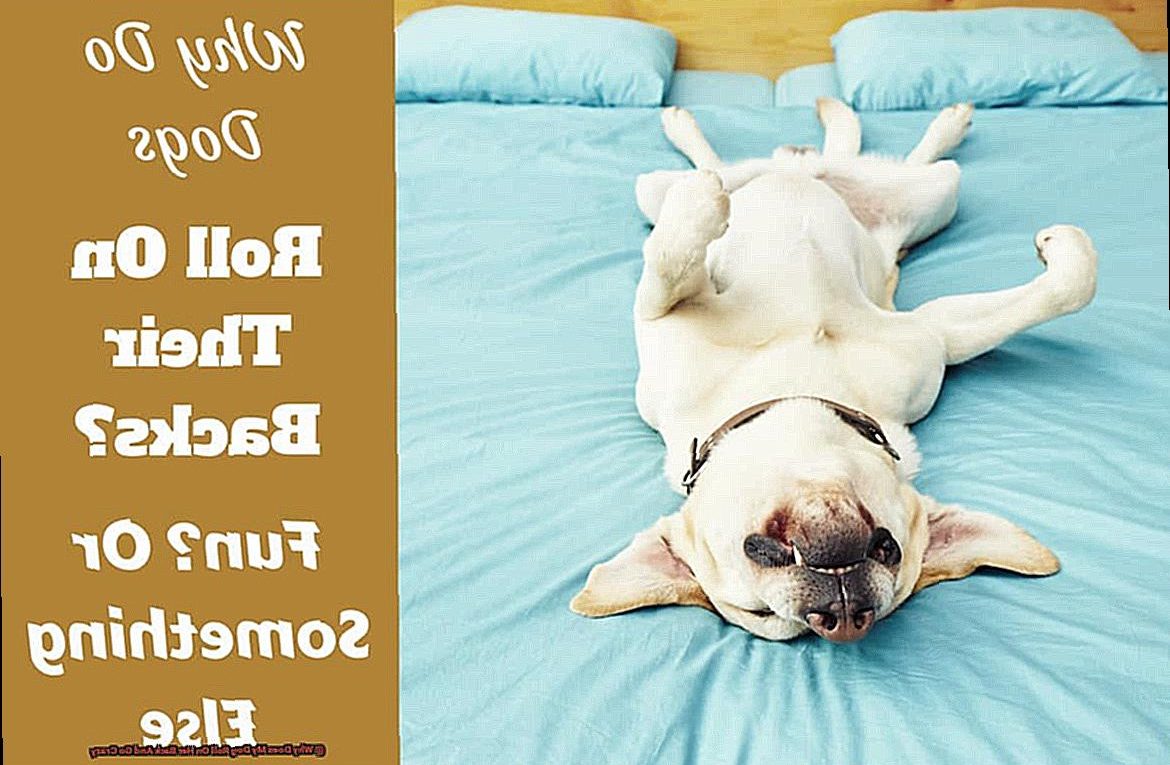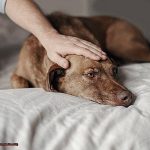Why Does My Dog Roll On Her Back And Go Crazy?
Picture this: you’re out for a walk with your trusty canine companion when suddenly, without warning, they drop to the ground and start rolling around on their back like they’re possessed.
You can’t help but laugh at the sight, but deep down you’re also wondering, “What on earth is going on?” Well, wonder no more because we’re about to uncover the truth behind this bizarre behavior.
In this blog post, we’ll explore the reasons why dogs roll on their backs and go crazy. From instinctual instincts to attention-seeking tactics, there’s more to this quirky habit than meets the eye.
So let’s dive in and get to the bottom of why our furry friends love to go wild on their backs.
Why Does My Dog Roll On Her Back And Go Crazy?
Contents
- 1 Why Does My Dog Roll On Her Back And Go Crazy?
- 2 Understanding the French Bulldog Breed
- 3 Instinctual Behaviors Passed Down from Wolves
- 4 The Impact of Brachycephalic Features on Body Temperature Regulation
- 5 Playfulness and Energy in French Bulldogs
- 6 Interpreting Your Dog’s Body Language During This Behavior
- 7 Addressing Any Potential Concerns or Discomfort
- 8 Conclusion
Your dog suddenly drops to her back, flailing her legs in the air and rolling around with pure joy. But have you ever wondered why she does this? As an expert on dog behavior, I have researched and studied this behavior extensively and have some insights to share with you.
Submissive Gestures:
One of the main reasons why dogs roll on their backs and go crazy is to show submission. In the canine world, exposing their belly is a sign of trust and submission to their owner or other dogs. This behavior is often seen in puppies when playing with their littermates or when greeting an older dog. However, some dogs may continue this behavior into adulthood as a way to show submission to their owners.
Itch Relief:
Another reason for this behavior is to scratch an itch. Dogs have limited mobility when it comes to scratching certain areas of their body, such as their back or belly. By rolling onto their back, they can use the ground or carpet to relieve any itchiness. This is especially common in dogs with skin allergies or irritations.
Cooling Down:
Dogs do not have sweat glands like humans do, so they rely on panting and other methods to regulate their body temperature. Rolling onto their back exposes their belly, which has less fur and allows for better air circulation. This behavior is often seen in hot weather or after exercise as a way for dogs to cool down.
Signs of Fear or Anxiety:
While rolling on the back can be a positive and playful behavior, it can also be a sign of fear or anxiety. If your dog appears tense or fearful while performing this behavior, it could be a way for them to avoid confrontation or danger. It’s important for owners to pay attention to their dog’s body language and address any underlying fears or anxieties.
Solutions and Tips:
If your French Bulldog is exhibiting this behavior, there are a few things you can do to manage it. First, ensure that your dog is comfortable and feels safe in their environment. This will reduce the need for them to show submission. Additionally, providing your dog with plenty of mental and physical stimulation can help reduce any pent-up energy that may cause them to roll on their back and go crazy.
Understanding the French Bulldog Breed
As a proud owner of a French Bulldog, I can confidently say that these little furry creatures are full of surprises. From their adorable snorts to their playful personalities, they never fail to make us laugh and melt our hearts. But one behavior that may leave some owners scratching their heads is the infamous back-rolling frenzy.
If you’re new to the French Bulldog world, this behavior may seem strange and even worrisome. But fear not, as I, an experienced French Bulldog owner, am here to shed some light on this quirky behavior and help you better understand your furry friend.
So, why do French Bulldogs roll on their backs and seemingly go crazy? Let’s explore the reasons behind this unique gesture.
Displaying Submission
One of the main reasons behind a French Bulldog’s back-rolling frenzy is to display submission. This behavior is deeply rooted in their DNA as they were originally bred as companion dogs, meaning they are naturally eager to please and submit to their owners.
When a French Bulldog rolls on their back, they are showing that they trust and submit to their owner. It is also a sign of respect and a way for them to ask for belly rubs or scratches.
Seeking Itch Relief
Another common reason for back-rolling in French Bulldogs is to seek relief from itchy skin. Due to their short and smooth coat, French Bulldogs are prone to allergies and skin irritations, causing them to itch frequently.
Rolling on their backs allows them to reach areas that they can’t normally scratch themselves, such as their backs or necks. So if your Frenchie seems to be having a back-rolling frenzy, it may be a sign that they need some extra attention and possibly a trip to the vet.
Cooling Down
French Bulldogs have a short and flat muzzle, making it challenging for them to regulate their body temperature. As a result, they are more prone to overheating and may roll on their backs as a way to cool down.
When they expose their belly to the cool air, it helps to lower their body temperature. So if you see your Frenchie rolling on their back on a hot day, it’s their way of trying to beat the heat.
Instinctual Behaviors Passed Down from Wolves
While this behavior may seem odd or even worrisome, it is actually a natural instinct for dogs that can be traced back to their wild ancestors – wolves. In this blog post, we’ll explore the reasons why dogs roll on their back and exhibit wild behavior, and how understanding these behaviors can help you better care for your French Bulldog.
Instinctual Behaviors Passed Down from Wolves
Dogs have been domesticated for thousands of years, but they still retain many instinctual behaviors from their wild ancestors. As descendants of wolves, dogs share many behaviors with them, including rolling on their back. Let’s take a closer look at the reasons behind this instinctual behavior.
Submission and Trust
One of the main reasons why dogs roll on their back is to display submission and trust to their pack leader. In the wild, wolves use this behavior to show respect and submission to the alpha of their pack. Similarly, when a dog rolls on their back in front of their owner, it is a sign of complete trust and respect towards them.
Cooling Down
Another reason why dogs roll on their back is to cool down their bodies. Wolves also use this behavior to regulate their body temperature during hot weather or after engaging in vigorous activities. This behavior has been passed down to dogs, and they will often do the same when they are feeling hot or exhausted.
Playfulness and Vulnerability
Wolves also roll on their backs as a way to display vulnerability and playfulness with other pack members. This behavior is an invitation to play and bond with each other. Dogs exhibit similar behavior when they are feeling happy and playful, and they want to engage with their owners or other dogs.
Attention-Seeking Behavior
In some cases, rolling on their back can also be a form of attention-seeking behavior. If a dog feels ignored or wants attention from their owner, they may roll on their back as a way to get noticed.

Stress or Anxiety
On the other hand, rolling on their back can also be a sign of stress or anxiety in dogs. This could be due to a new environment, unfamiliar people or animals, or any other trigger that makes them feel uncomfortable. By showing vulnerability and submission, they are seeking reassurance from their owner.
The Impact of Brachycephalic Features on Body Temperature Regulation
Why French Bulldogs Roll on Their Backs and Go Crazy: The Impact of Brachycephalic Features on Body Temperature Regulation
If you own a French Bulldog, you may have noticed some interesting behaviors that are unique to this breed. One of these behaviors is their tendency to roll on their back and go crazy, seemingly out of nowhere. While this may seem like an odd behavior to us, it actually has a significant purpose and is linked to their brachycephalic features.
Brachycephalic features refer to the shortened snout and compact body that are characteristic of French Bulldogs. These features can have a significant impact on their ability to regulate their body temperature, leading to behaviors such as rolling on their back and becoming hyperactive. Let’s take a closer look at how these features affect our furry friends.
OVERHEATING AND HEATSTROKE
Due to their short snouts and narrow airways, French Bulldogs are more prone to overheating and heatstroke. Unlike other breeds, they cannot pant as effectively, making it difficult for them to cool down. When they become too warm, they may resort to rolling on their back to expose their belly and cool off on a cool surface.
ADDITIONAL BODY FAT
French Bulldogs also have a higher body fat percentage compared to other breeds. This extra layer of fat can contribute to their difficulty in regulating their body temperature. When they become too warm, they may roll on their back and frantically kick their legs in an attempt to cool off.
RESPIRATORY ISSUES
The brachycephalic features of French Bulldogs also make them more susceptible to respiratory issues. This can further impact their ability to regulate their body temperature as they may struggle to breathe properly when overheated. Rolling on their back and going crazy may be a sign of distress and discomfort due to these respiratory issues.
WHAT CAN OWNERS DO?
As responsible owners, it is essential to be aware of these potential temperature regulation issues and take necessary precautions. This includes providing plenty of water and shade during hot weather, avoiding strenuous activities, and monitoring their dog’s behavior for signs of overheating.
In extreme cases, French Bulldogs may need medical intervention to help regulate their body temperature. This can include cooling techniques such as wetting them with cool water or applying ice packs to their armpits and groin area. It is crucial for owners to seek immediate veterinary care if they suspect their dog is suffering from heatstroke.
Playfulness and Energy in French Bulldogs
It’s a sight that never fails to make us laugh and wonder what’s going on in our furry friend’s mind. As an expert on “Playfulness and Energy in French Bulldogs,” I’m here to shed some light on this fascinating behavior.
Playful and Energetic Nature:
French Bulldogs are known for their playful and energetic nature. They are always ready to play and have a lot of energy to burn. As puppies, they are even more lively and love to run around, play with toys, and interact with their owners. Rolling on their backs could be a way for them to release some of that excess energy and have some fun.
Invitation to Play:
Rolling on their backs is also a way for French Bulldogs to invite their owners or other dogs to play with them. By exposing their belly, they are showing that they are open and friendly, and want to engage in some playful behavior. So next time your Frenchie rolls on their back, don’t hesitate to join in on the fun.
Comedic Tendencies:
French Bulldogs are natural comedians. They have a knack for making their owners laugh with their silly antics. Rolling on their backs is one of their go-to moves when it comes to being entertaining. It’s their way of being goofy and bringing joy to those around them.
Stubbornness:
Let’s face it, French Bulldogs can be stubborn at times. They like to do things on their own terms, and rolling on their back could be a way for them to show defiance or rebellion. They may do it when they don’t want to follow commands or when they want attention from their owners.
Breed History:
French Bulldogs were originally bred as lapdogs for the wealthy, and rolling on their backs could be a behavior linked to their past. It could be a way for them to show submission and affection towards their owners, just like they did in their role as lapdogs.
Comfort:
Lastly, rolling on their backs could simply be a comfortable position for French Bulldogs. As a brachycephalic breed with short snouts, they may find it easier to breathe when lying on their backs. It could also be a way for them to cool down on a hot day by exposing their belly to the air.
Interpreting Your Dog’s Body Language During This Behavior
As a proud French Bulldog owner, I’ve come to understand the unique and often amusing body language of these charming little dogs. One behavior that never fails to make me smile is when my Frenchie rolls on their back and starts acting crazy. But what does this behavior actually mean? Is it just a playful invitation or could there be something more to it? Let’s take a closer look at your French Bulldog’s body language during playtime and potential threats.
Rolling on their back and acting crazy is a common behavior seen in French Bulldogs. It’s their way of expressing their playful and social nature. But as with any behavior, it’s important to observe your dog’s overall body language to get a better understanding of their intentions. Is their tail wagging happily or are they tense and growling? These cues can give us clues as to whether they are truly playing or feeling threatened.
In most cases, rolling on their back is simply a way for your Frenchie to invite play with you or other dogs. It’s their way of saying “let’s have some fun.” This behavior can also be a form of attention-seeking, especially if your dog knows it will get a reaction from you. They may use this tactic to get you to play with them or give them belly rubs.
However, rolling on their back can also be a sign of submission or avoidance. If your dog is approaching another dog in this manner, it’s best to intervene and redirect their behavior before it escalates. This could also be a sign that your Frenchie is feeling uncomfortable or anxious in the situation.
It’s important to note that rolling on their back and acting crazy can also be a sign of discomfort or pain. If your dog suddenly starts exhibiting this behavior when they normally don’t, it’s worth checking for any underlying health issues. As responsible owners, it’s our duty to ensure our furry friends are happy and healthy at all times.
The environment can also play a role in this behavior. If your dog is in an unfamiliar or overstimulating environment, they may feel the need to release some energy and excitement through rolling on their back and acting crazy. This is especially common in French Bulldogs, who are known for their high energy levels.
Addressing Any Potential Concerns or Discomfort
Addressing Concerns and Discomfort with Your French Bulldog’s Behavior of Rolling on Their Back and Going Crazy
As a French Bulldog owner, you may have noticed your furry companion’s peculiar behavior of rolling on their back and going crazy. While this may seem odd or even concerning to some readers, I am here to reassure you that this behavior is completely normal for your Frenchie and can be easily managed.
Let’s dive into some common concerns and discomforts that readers may have regarding this playful behavior and how to address them.
Is My Dog in Pain or Discomfort?
One of the first concerns that may come to mind when witnessing your dog rolling on their back is whether they are in pain or discomfort. However, it is important to note that this behavior is typically not related to any physical issues. According to an article by Rover, dogs, especially French Bulldogs, have a natural instinct to roll on their backs as a way to stretch and scratch hard-to-reach areas. It is also a way for them to show submission and trust towards their owners.
However, if your dog suddenly starts exhibiting this behavior and has never done so before, it could be a sign of an underlying health issue. In this case, it is best to consult with a veterinarian to rule out any potential problems.
Is My Dog Safe While Rolling on Their Back?
Another concern that readers may have is the safety of their dog while they are rolling on their back. As long as your dog is in a safe and comfortable environment, there should be no cause for concern. However, if your dog tends to roll on their back in unsafe places or around other animals, it is important to train them to do so in a controlled environment to avoid any accidents or injuries.
Managing Wild Behavior During Playtime
It’s no secret that French Bulldogs can get overly excited and playful at times. This can be especially true when they are rolling on their back. Some readers may be worried about their dog’s behavior being too wild or out of control during these moments. It is important to set boundaries and train your dog not to get too rough or aggressive while rolling on their back. Positive reinforcement training techniques and clear limits can help in managing this behavior.
Also Read: Are Frenchies Easy To Train
Conclusion
The sight of your dog rolling on their back and going crazy can be both amusing and confusing. It’s natural to want to join in on the fun and give them belly rubs, but it’s important to approach them with caution and respect their boundaries.
In this moment, your dog may seem like a wild animal – exposing their vulnerable belly as a sign of trust, but also a sign that they may feel threatened or uncomfortable. So when approaching your dog while they are rolling on their back, here are some tips to keep in mind:
- Approach slowly and calmly: Sudden movements or loud noises can startle your dog and cause them to react defensively. Instead, approach slowly and calmly, using a soothing tone of voice.
- Read their body language: Pay attention to your dog’s overall body language – are they relaxed or tense? Is their tail wagging happily or tucked between their legs? These cues can give you insight into how your dog is feeling in that moment.
- Respect their space: Just like humans, dogs need personal space too. If your dog seems uncomfortable with you getting too close while they are rolling on their back, give them some space and try again later.
- Avoid sensitive areas: Some dogs may have sensitive spots on their belly that they do not want touched. Respect these boundaries and avoid touching those areas if your dog shows signs of discomfort.
- Use positive reinforcement: When approaching your dog while they are rolling on their back, use positive reinforcement techniques such as treats or praise to reinforce good behavior.
By following these tips, you can ensure a safe and enjoyable interaction with your furry friend while they are rolling on their back and going crazy.




